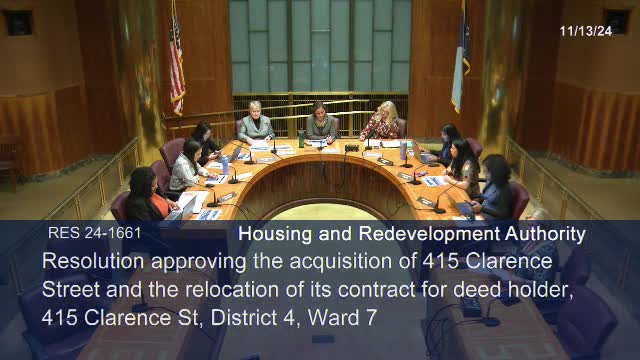HRA hears detailed parking enterprise fund briefing; staff to tighten budgeting and operations
Get AI-powered insights, summaries, and transcripts
Subscribe
Summary
Director Goodman presented details of the HRA’s parking enterprise fund, outlined pandemic revenue impacts, reserve requirements from bond covenants, current cash positions and steps to tighten revenue and capital forecasting; commissioners asked about potential ramp sales and operations.
The Housing and Redevelopment Authority received a detailed briefing on the HRA parking enterprise fund and on budgeting steps to better align revenue and expense forecasts.
Director Goodman said the HRA owns and operates multiple downtown parking ramps and that parking revenue was “significantly impacted by the pandemic.” She said net operating income in 2019 was "nearly $10,000,000." She described a subsequent major drop tied to the pandemic and noted recovery in 2022–2024 driven largely by event and arena activity: "The things that are happening at the arena are what are keeping our parking system going," Goodman said.
Goodman explained parking operations are funded primarily with bonds and therefore must maintain reserves required by bond covenants (repair and replacement reserve, debt reserve, and a debt-service reserve for next year's bond payment). She also described best-practice reserves for operations, meter-and-fine revenue, and future-year commitments. She told commissioners those reserves and prudent budgeting helped the enterprise withstand the pandemic shock.
On fund balances, Goodman said the parking fund currently holds roughly $15–18 million in cash and reserves and that the HRA has about $2.7 million in unrestricted cash: "It is a relatively small portion of our budget, but I think it's noteworthy that it's $2,700,000 of unrestricted cash that is currently at the discretion of the HRA Board," a commissioner observed and Goodman confirmed. She cautioned that some line items (space rental, insurance and assessments) can lag in recording and that capital outlay estimates have historically been conservative to cover unexpected repairs (for example, elevator failures).
Goodman told commissioners she and CFO Nicole Green will tighten forecasts by reviewing maintenance schedules for each ramp, re-evaluating capital-outlay budgeting, and analyzing periodic line items such as neighborhood parking program costs. She said the HRA will seek a more precise schedule of likely repairs to avoid overbudgeting for capital outlay and to reduce reliance on reserves.
On operations, Goodman said the World Trade Center ramp (serving Wells Fargo Place) is tracked separately because it is essentially a single-tenant contract; revenue there is relatively static, and assessments such as property insurance can be billed at year-end. She also said the HRA will issue a request for proposals for parking operators to create competition where long-term contracts previously existed.
Commissioners asked whether any ramps would be sold. Goodman said there is no current plan to sell ramps; any sale would require a cost–benefit analysis. She noted the Fox lot is a small surface parcel that could be sold as part of adjacent development in the future. "We're not currently planning to sell any of our ramps," Goodman said, while acknowledging potential future opportunities tied to development parcels.
The board discussed the role of the ramps in downtown vitality, including the Lawson Ramp’s ground-floor retail, and noted HRA ramps can be used in operations like snow emergencies to remove cars from streets. Goodman said ARPA funds have been used for some capital repairs and that recent event activity has helped revenue recover. She and commissioners agreed to continue tightening revenue and expense forecasting; no formal vote or policy change related to parking assets was taken at the meeting.
